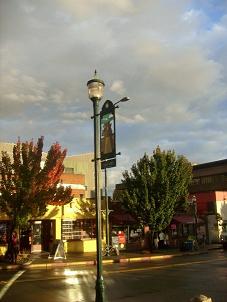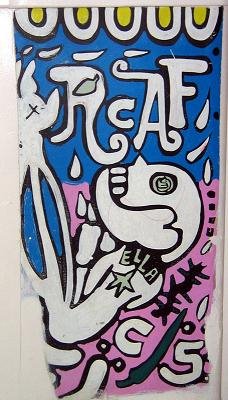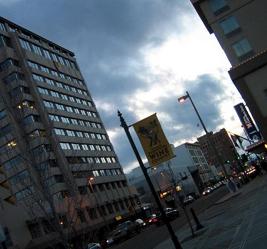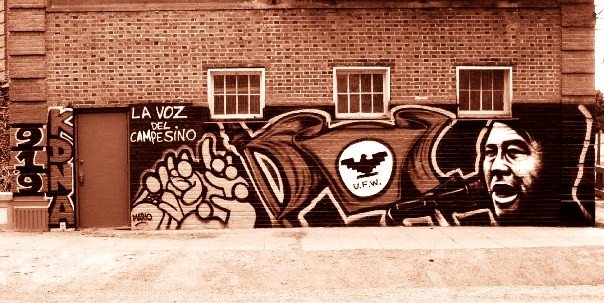In addition to physical image and document collections, there are also archives found online that range from labor history to visual art movements in
Washington’s Chicana/o and Latina/o community. One such source is the
Chicano/Latino Archive hosted by The Evergreen State College Library. This research and teaching collection focuses on Chicano and Latino art in the Pacific Northwest, activity mostly during the 1970s and 1980s which ran parallel to literary and performance art movements and helped incorporate visual arts as a tool for expressing the goals of the Chicana/o Movement. Included in the archive is a guide to the original “Chicano/Latino Artists in the
Pacific Northwest” exhibit (1984-86), an article from the UW-produced “Metamorfosis” journal on the state of the art movement, and an exhibit catalog, among others.
Another archive in Western Washington south of Seattle are the Columbia River Basin Ethnic History Archives at Washington State University, Vancouver Campus. The project itself is done in collaboration with the Idaho, Oregon and Washington State Historical Societies, as well as with the WSU-Pullman. The project focus is to highlight the presence of the oft ignored ethnic minority groups in the tri-state Columbia River Basin region (Western and Southwestern Idaho, Northern Oregon, Southern and South-Central Washington).
The University of Washington also houses two research units associated with Harry Bridges Center for Labor Studies. Created in 2004, the United Farm Workers in Washington State History Project documents the formation and evolution of farm labor history in the Yakima Valley from the late 1960s to the present (the unit is also undergoing an expansion). Of note are transcripts of interviews, a photo essay history of the UFW as seen through images donated by long time labor activist, Tomas Villanueva, as well as a page with external links to sites of interest.
The other of these two archives is the Seattle Civil Rights & Labor History Project. Within the archive is the “Chicana/o Movement in Washington State History Project” which was initiated in 2005 with the aid of a group of undergraduate researchers connected to MEChA de UW. The section includes a history timeline, a collection of oral histories, a page containing photo collections donated, a slide show, a historical narrative, a list of digitized newspaper articles and a special documents collection from MEChA de UW’s archive.
The last archive listed is the An Oral History Of The Crewport Farm Labor Camp project produced for the Center for Columbia River History, a unit produced in collaboration between Washington State University and Yakima Valley Community College. The Crewport archive includes a historical narrative created by then YVCC Professor, Mario C. Compean, a list of oral history interviews, a photo essay as well as a set of documents.
In addition to the aforementioned archives, yet another valuable resource is Dr. Jose Alamillo's Chicanos in the Northwest Project. Alamillo, formerly an Associate Professor in Comparative Ethnic Studies at Washington State University-Pullman, produced a brief narrative on Chicanos in the Northwest and published it on his own website. He also provides a bibliographic list of sources relevant to the regional study of Chicanos and Latinos in the Northwest.
Chicano/Latino Archive. <http://www.evergreen.edu/library/chicanolatino/>. The Evergreen State College. Accessed 11/15/08.
Columbia River Basin Ethnic History Archives. <http://www.vancouver.wsu.edu/crbeha/>. Washington State University, Vancouver Campus. Accessed 11/15/08.
Seattle Civil Rights and Labor History Project. <http://depts.washington.edu/civilr/index.htm>. University of Washington. Accessed 11/15/08.
United Farm Workers in Washington State Project, <http://depts.washington.edu/pcls/ufw>. Accessed 11/15/08.
An Oral History Of The Crewport Farm Labor Camp, Center for Columbia River History, <http://ccrh.org/comm/crewport/index.html> Yakima Valley Community College and Washington State University, Accessed 11/15/08.
Chicanos in the Northwest Project,
Washington State University, Accessed 11/15/08





.jpg)
.jpg)






.jpg)

No comments:
Post a Comment